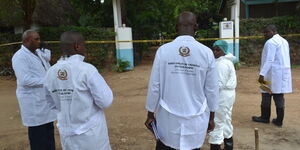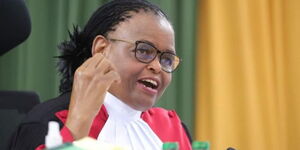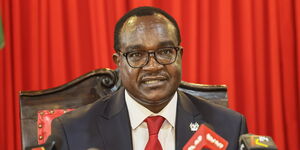Antony Kariuki, a resident of Nairobi, was forced to raise Ksh750,000 after 3 members of his family (himself included) tested positive for Covid-19.
The bill accrued after a 4-day stay at a hospital in Nairobi.
"I remember when it came to paying the bills, the insurance company refused to cover anything. It was a heavy burden on us," Wamwene Kariuki (Antony's wife) recalled.
She went on to detail the contents of the hospital bill, highlighting items that raised questions in terms of their high pricing.
{"preview_thumbnail":"/files/styles/video_embed_wysiwyg_preview/public/video_thumbnails/42uh9I5SqLM.jpg?itok=RoGeYUHQ","video_url":"","settings":{"responsive":1,"width":"854","height":"480","autoplay":0},"settings_summary":["Embedded Video (Responsive)."]}
"What stood out were the Personal Protective Equipments (PPEs). I think it was Ksh9,000 per PPE and we were being charged 3 PPEs per person each day. You can imagine I was charged 3, my husband 3 and our son 3," she explained.
Francis Sarampash, a Kajido resident shared a similar story, after he was handed a Ksh70,000 bill following 4 days of Covid-19 treatment at the county's referral hospital.
His National Hospital Insurance Fund (NHIF) card could not help.
He wondered what was the point of making the statutory NHIF payment when it did not translate to easing his medical burden when he needed it the most.
According to reports, the Covid-19 bills vary depending on each patient's condition. For example, those in need of oxygen and Intensive Care Unit treatment end up with higher bills as compared to asymptomatic patients.
It costs Ksh21,359 to treat an asymptomatic Covid-19 patient in a government hospital a day, and KSh21,361 for a patient with mild symptoms.
Patients with severe cases are charged Ksh24,705 a day, while those requiring Intensive Care Unit (ICU) services are charged Ksh51,684 daily.
The current crisis follows the November 11, announcement from the Health Ministry which revealed that it was not financially viable for the NHIF to cover the bills for Covid-19.
“The cost burden of financing Covid-19 testing and treatment for NHIF beneficiaries both in the National Scheme and the Enhanced Medical Schemes would not be financially viable since it was not envisaged in the current NHIF premiums computation and the existing benefits package,” Health CS Mutahi Kagwe explained to the Senate on the day.
“It is not practical for NHIF and private insurance companies to cover pandemics,” he added.
This did not go down well with the majority of Kenyans who pointed out the tough economic conditions they have been facing on a daily basis since the coronavirus was reported in Kenya.
Reports from public hospitals indicate that the government stopped footing bills for Covid-19 patients back in June, claims that the Health ministry has categorically denied.
However, the latest statement from Kariuki's family claiming to have been asked to foot their entire bill in June 2020, contradicts the Ministry's statement.
President Uhuru Kenyatta's decision to foot veteran broadcaster Leonard Mambo Mbotela's hospital bill over the weekend raised even more questions.
"What will happen to the medical bills of the tens of millions of jobless Kenyans? Will the president ‘silently’ pay for their medical bills as well?" a concerned citizen questioned.
The recent revelation by the Controller of Budget Margaret Nyakangohat counties had only spent Ksh3.43 billion of the Ksh13.1 billion disbursed for the implementation of Covid-19 interventions since March 2020 raised even more eyebrows.
In just three months to June 2020, the public debt had ballooned by Ksh410 billion to Ksh.6 trillion, in one of the fastest accumulation of public debt by the Jubilee administration. This translates to about Ksh136 billion a month or Ksh4.5 billion a day.
In March 2020, the number of employed Kenyans aged 15 to 64 years stood at 17.5 million. This dropped to 15.8 million by the end of June 2020.
This means that 1.7 million Kenyans have been rendered jobless, according to the latest data from the Kenya National Bureau of Statistics (KNBS).
Only a few private insurance companies offer cover for Covid-19 patients in Kenya.
"The Management of Covid-19 cases will be allowed in private medical facilities up to the limit of the cost of treatment in designated government facilities," reads a statement on Resolution Insurance's website.
Kenyans have taken to social media to express their anger and disappointment regarding the stance taken by NHIF, dubbing it as daylight robbery.
"One of the Big 4 Agenda pillars is affordable Universal Health Care. Then the same government that hopes to achieve this goal, goes ahead to say NHIF insured Kenyans suffering from Covid-19 will have to foot all their bills. What I'm I missing here," one Kenyan opined.
Others simply questioned the governments priorities, following the ongoing Ksh14 billion Building Bridges Initiative (BBI) budget, exclusive of the cost of a nationwide referendum.












